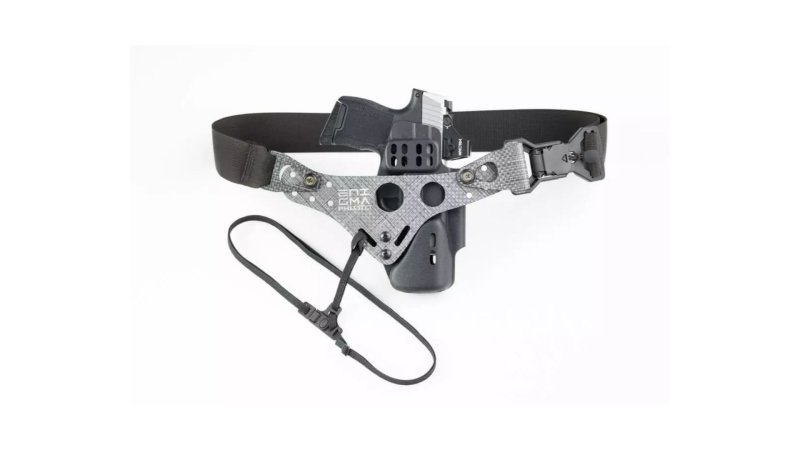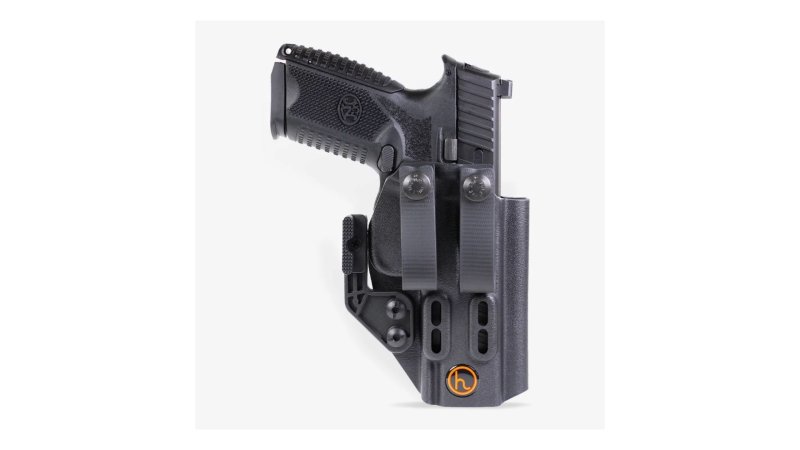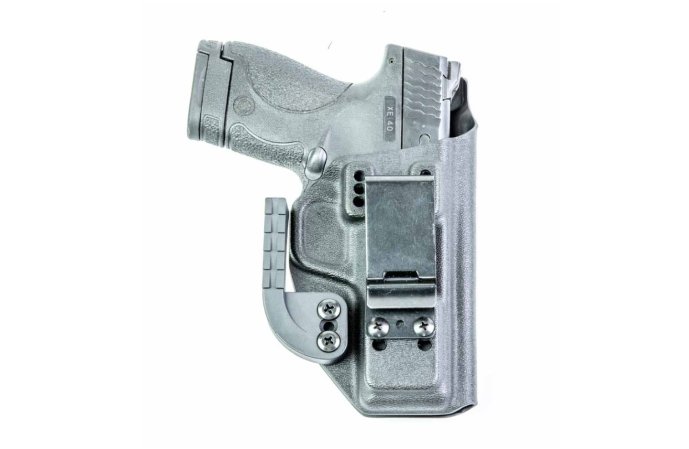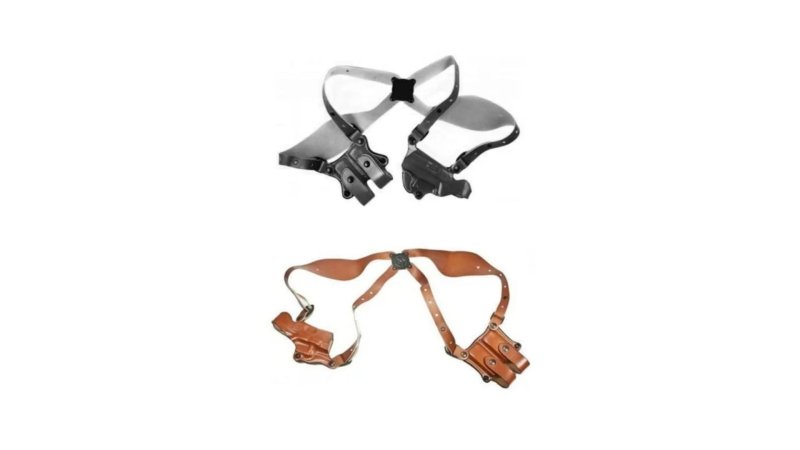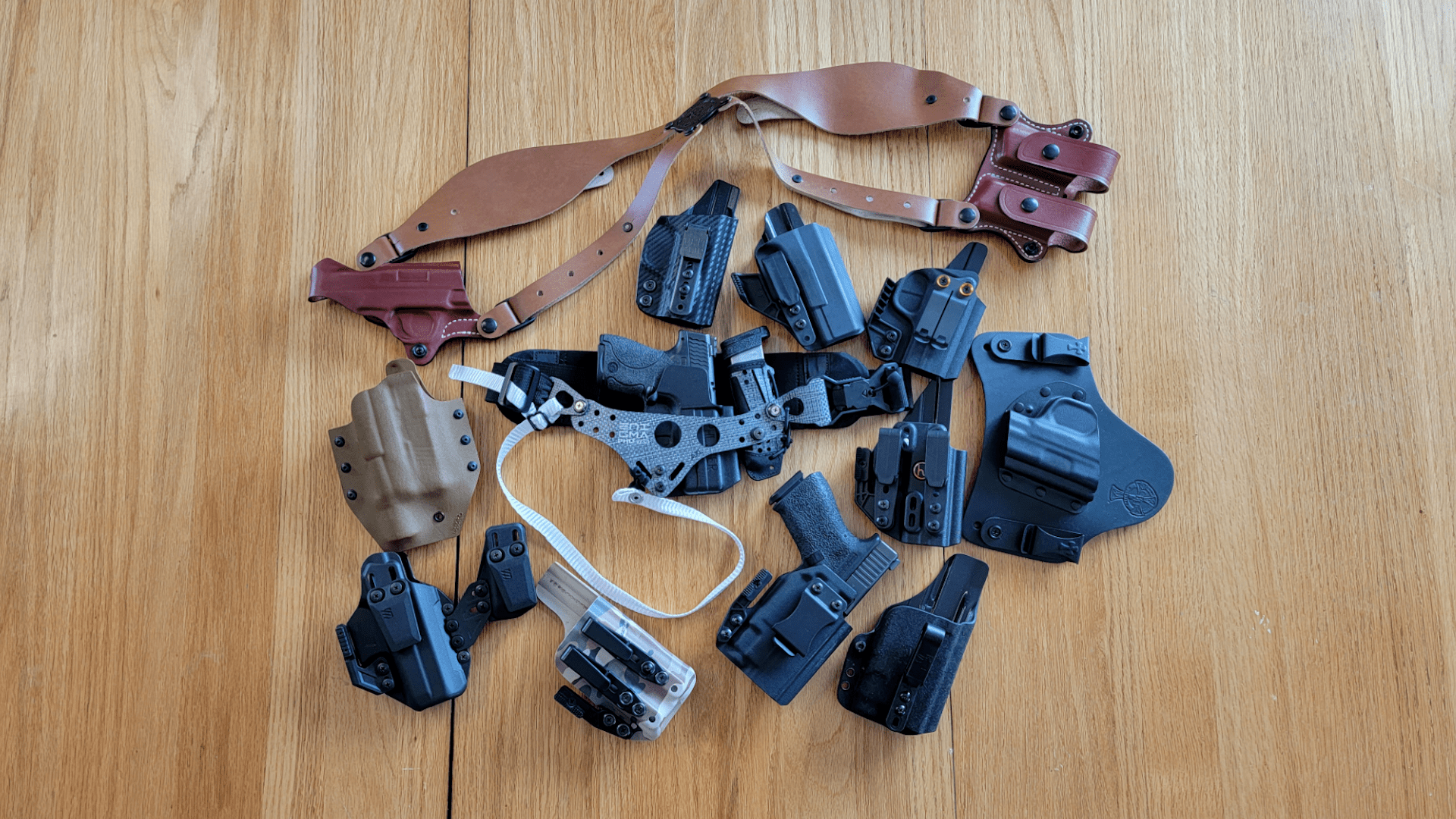

We may earn revenue from the products available on this page and participate in affiliate programs.
Picking a cute outfit for your day is already hard enough, but adding a gun and a bulky holster to the equation just complicates things further. Most holsters were designed for a man wearing a loose-fitting shirt and pants, meaning women who want to carry must conform to that standard. Needless to say, this does not mesh well with form-fitting clothing so common with women’s clothes. That’s why we set out to find the best concealed carry holster for women.
In this article, we cover some of our favorite holster options, as well as some of the more niche offerings available today. In addition to ranking holsters, we will go over our process of how we select which are good, great, bad, and ugly in order to save you some time and frustration when choosing the right holster for your needs.
- Best Overall: PHLster Enigma
- Best Value: Henry Holsters Flint
- Honorable Mention: Dark Star Gear Hitchhiker
- Best Shoulder Holster: DeSantis New York Undercover
Methodology
When it comes to shooting and carrying firearms, I take things pretty seriously. I’ve been in and around the gun industry and community for about nine years and I’m always searching for the latest and greatest piece of gear that claims to solve all my problems with carrying a concealed firearm. I attend training courses as often as possible to ensure my proficiency doesn’t suffer, as shooting is a perishable skill. Throughout my years, I’ve taken classes by well-known shooting instructors like Dave Maynard and John Correia, and from formal training schools as well.
Taking everything I can from these classes, I have applied the lessons to my daily life as a licensed concealed carry permit holder over the last three years. During my concealed carry journey, I have tried a vast array of concealed carry holsters that claim to offer the most comfortable and concealable package on the market. The biggest issue with most holsters on the market is not specifically if they will conceal well, but if they will conceal well with women’s clothing.
While there are seemingly endless options for concealable holsters from a multitude of manufacturers, I set out to compile some of the best, specifically for women since we are generally overlooked by holster manufacturers who seem to think everybody who carries is a guy wearing a plaid shirt and loose cargo pants. I narrowed my search based on feedback that I have gotten from other women who carry on a daily basis, online sources, and things that I have learned throughout my time as a concealed carry permit holder.
I limited my search to holsters constructed from durable material and designed to completely cover the trigger guard. The reason is, we don’t want any foreign object poking into the trigger guard and accidentally actuating the trigger. For this reason, nylon holsters and most leather holsters did not make it into my top picks. I tried to keep budget in mind, with most holsters landing in the $85 to $100 range, with a couple of exceptions for those who may need more specialized options.
For this review guide, I tested a total of 17 holsters (both for the Glock 19 and the Smith & Wesson M&P Shield) by wearing them as I would normally. I judged each holster not only on comfort and how well they conceal but also on the types of clothing I was able to wear without printing (having a visible outline of the shape of the firearm through clothing).
The biggest issue that we face as women who carry on a daily basis is that most inside-the-waistband holsters are designed to only work with pants and a rigid belt, but what are we supposed to do when we want to wear a dress, skirt, or leggings and a tank top? Most of the holsters on this list did well with a traditional belt and pants outfit, but there were a couple that exceeded my expectations with other clothing combinations.
Best Overall
PHLster Enigma
Pros
- Jeans are optional
- Compatible with a variety of holsters
- Safe and easy to use after initial set up
- Generous wardrobe options
Cons
- Costs quite a bit more than most AIWB holsters
- Adjustments needed to find the right fit
Product Specs
- Material:
- Kydex shell holster
- Carbon fiber faceplate
- Nylon belt strap or elastic sport band
- Quick-release magnetic buckle (low-profile tri glide sold separately)
- Nylon leg leash with quick-detach buckle
- Fits:
- Any Kydex holster with hardware holes that correspond with holes in faceplate
Best Value
Henry Holsters Flint
Pros
- Quality-made holster that conceals well
- Durable design
- Concealment wing comes standard
- Can be made to work with PHLster Enigma
Cons
- Non-adjustable retention
- Any color you want, as long as it’s black
Product Specs
- Kydex shell
- Tuckable belt clip
- Concealment wing
- Optics-ready
- Built-in wedge
Honorable Mention
Dark Star Gear Hitchhiker
Pros
- Extra length beyond muzzle keeps gun flat against your body
- Contoured edges for added comfort
- Angled concealment wing pushes out on belt
Cons
- Long lead times
- Concealment wing can stress edge of the holster
- No options for subcompact guns with a light attached
- Extra color options start at $15 and up
Product Specs
- Fits Glock, Beretta, Sig Sauer, Walther, HK, and Su0026W firearms
- Multiple color options available
- Adjustable retention
- Adjustable cant
Best Shoulder Holster
DeSantis New York Undercover
Pros
- Shoulder-carry method still the best for long dress styles
- Great for sitting for long periods
- Shoulder straps are wide and spread out the weight of the gun
- Pivot points at all four strap junctions
Cons
- Must take extra care when drawing due to position of muzzle
- Not as fast as appendix carry
- Requires cover garment to be open/easy to open
Product Specs
- Fits firearm with no attachments
- Two magazine pouches opposite of firearm holster
- Top-grain cowhide leather
- Fits up to 54-inch chest
Our verdict on the best concealed carry holsters for women
The PHLster Enigma is the best overall holster for women’s concealed carry because it allows you to carry independent of almost all wardrobe choices. It’s like nothing I have ever used and will be a tough act for any holster manufacturer to follow.
If you are on a budget, the Henry Holsters Flint is a wonderful option as a simple design that comes in at an affordable price, ships extremely quickly, and incorporates all of the major requirements when I look for an appendix inside-the-waistband holster.
While inside-the-waistband carry is the most recommended method, there are still applications where shoulder holsters come out on top, and the DeSantis New York Undercover accomplishes the task wonderfully. The Undercover’s proven design has stood the test of time and works with any body type.
What to consider when buying concealed carry holsters
Before you buy a holster, you should first figure out where you want to carry your firearm. This will determine the options available to you, as well as what sort of clothing you can wear to help conceal your gun.
Next will be the size of your firearm. While bigger guns are possible to carry concealed, the bigger the gun, the more compromises will have to be made in order to effectively hide the outline of the gun.
After you decide what and where you want to carry, you should then think about comfort, quality, and ease of use. If you have a holster that is uncomfortable, chances are you will be more inclined to leave your gun at home, and it won’t do you much good sitting in the safe.
Types of concealed carry holsters
Outside-the-waistband
Outside-the-waistband (OWB) holsters are typically worn openly in a duty capacity, but it’s not totally unheard of for concealed carry. The biggest benefit of OWB carry is comfort since your gun and holster aren’t making direct contact with your body. The downside is you will need a cover garment that is long enough to completely cover the bottom end of the gun and holster even if you bend over or extend your arms up
Inside-the-waistband
An inside-the-waistband holster (IWB) holster is the most common method of concealed carry. The benefit is that it makes concealing a handgun much easier than an OWB holster because it’s worn between your pants and your body, naturally concealing the gun under your normal clothes. This does trade some level of comfort, however, which is why there’s less variety in holster style to accommodate the more restrictive position.
Traditionally, most people carry IWB holsters at the four or five o’clock position, but this is starting to become less common as carrying in the front over your appendix (called appendix carry) or right on the centerline of your body due to how fast your draw stroke can get with some practice. Small-of-the-back carry is another position that has gone out of style, largely discouraged because if you fall and land on the gun or have even a minor traffic accident, you could suffer a severe back injury.
Shoulder holsters
Shoulder holsters are the best option for some women because of their body type or they expect to be wearing dresses often. While somewhat less common in the law enforcement community than they used to be, shoulder holsters still exist and are used by undercover agents and concealed carriers alike. Holsters that keep the muzzle parallel to the ground are often preferred for smaller guns, while longer firearms can be concealed with a muzzle-down design.
The first thing to consider when using a shoulder holster is that you’ll need to wear a cover garment like a jacket or loose-fitting shirt to conceal your firearm. Second, you’ll also need to be able to have quick access to your firearm through the front of your garment, so having a button-up shirt completely closed won’t help you at all. Lastly, muzzle discipline is extra important when drawing from a shoulder holster, as any wide sweeps will threaten anyone in the arc of your arm. Practice makes perfect here in keeping the muzzle in a safe direction while drawing.
Key features of a concealed carry holster
Rigidity
The most important feature of any holster is rigidity, or the ability for the holster to resist collapsing inwards when the gun is drawn or if something hard were to be pressed into the holster which could accidentally actuate the trigger. The former is especially important because if the holster flexes when you are putting a loaded gun into it, there is a possibility that the trigger can get snagged on the edge of your holster and result in a negligent discharge.
Concealability
This can be affected by very minor-seeming features such as material thickness, hardware or belt clips, wedges, and concealment wings. Ride height, or how much of the gun is above the belt line, will also play a part in how easy it is to conceal. Too high, and your body will naturally press the gun outward and cause printing. However, if it is sitting too low, you may not be able to get a full grip on your gun and cause a slower draw. This is where the Enigma truly shines with its ability to be worn completely independent from your clothing so you are able to position the firearm where it will be the most concealable while also maintaining a repeatable draw stroke.
Comfort
Once you have picked out a good quality holster from a reputable manufacturer, next comes finding the right fit for you. This will depend on how and where you want to carry your firearm. I find that when carrying appendix, the biggest issue is hard edges and corners. This is why I try to look for holsters that have rounded edges near the muzzle end and near any corners that will be poking in towards my body. If the holster you select doesn’t come with a built-in wedge, you can add a foam pad or a Dr. Scholls shoe insert cut to size that will cover the corner that is digging into you creating a hotspot.
Concealed carry holster pricing
Depending on quality, holsters meant for concealed carry can range from $20 to $150. For a good, quality appendix inside-the-waistband holster, expect to pay at least $60, with most going for anywhere between $80 and $100, with the same being true for outside-the-waistband and shoulder holsters.
Tips and tricks for buying a concealed carry holster
Concealment holsters
- Select a holster with a modwing, a lever that pushes out on your belt, which will help push the end of the grip into your body.
- Wide belt clips make for a more solid foundation and will prevent the gun from rocking side to side.
- Foam wedges or wedges that are molded into the holster itself can also be a valuable tool to help bring the grip of your gun toward your body.
Concealment garments
- Select cover garments that have features such as patterns, dark colors, loose fits, or shirts with more structure such as linen.
- Holsters that are made to allow the wearer to tuck their shirt in behind the belt clip and in front of the gun are especially helpful if you need to tuck your shirt in.
- When weather permits, wearing a jacket or hoodie can make it easy to conceal even a full-size gun.
- If carrying OWB or in a shoulder holster, the cover garment must be heavy enough to not be blown around by the wind. Keeping things like your keys or a wallet in a pocket can help weigh down your cover garment to prevent this.
FAQs about concealed carry holsters
You’ve got questions, Task & Purpose has answers.
Q: Is it hard to conceal-carry a larger gun?
A: As long as a good holster is selected and it is worn with a proper cover garment, concealing a larger or full-size gun can be done even by small-framed people.
Q: What’s the deal with ankle carry?
A: Ankle carry can be useful when using a gun with a short grip such as a Glock 26 or a small revolver, but is not as common these days.
Q: What options are there for plus-sized bodies?
A: The PHLster Enigma can be a great option as long as the waist strap and leg leash fit. Holsters that are designed to be carried in the three- to five-o’clock position can also be more comfortable than appendix carry.
Q: Are belly bands or thigh holsters any good?
A: Generally speaking, no. These types of holsters tend to be made out of a flexible fabric that doesn’t offer any sort of protection for the trigger.
Q: I don’t want to carry on my body, so can I keep my gun in my purse?
A: It depends. It can be difficult to draw a pistol from most off-the-shelf purses, but there are several companies making purses and bags designed with a pocket or pockets meant to hold a firearm. Either way, the other concern is retaining control of the purse and, in turn, your pistol. As is the case with any style of concealed carry, off-body carry is something you’ll have to train for.
